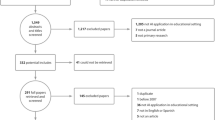Abstract
In this paper “quality of graduates” is distinguished from “quality of education”, which is renamed “efficiency of education”. The first concept is defined in a quantitative manner, the second by way of a set of 66 statements concerning the efficiency of education derived from judgements about the effectiveness of particular teaching methods in the achievement of different types of teaching objectives.
Similar content being viewed by others
References
Bligh, D. A. (1972). What's the use of lectures. Hammondsworth: Penguin Books.
Cronbach, L. J. and Snow, R. E. (1977). Aptitudes and instructional methods. New York: Irvington Publishers.
Dubin, R. and Taveggia, Th. C. (1968). The teaching-learning paradox. A comparative analysis of college teaching methods. Eugene, Oregon: Center for the Advanced study of Educational Administration.
Gaff, J. G., Crombag, H. F. M., and Chang, T. M. (1973). The university as a learning environment: an empirical analysis. Leyden: Educational Research Center University of Leyden, report no. 13.
Author information
Authors and Affiliations
Rights and permissions
About this article
Cite this article
Crombag, H.F.M. On defining quality of education. High Educ 7, 389–403 (1978). https://doi.org/10.1007/BF00139654
Issue Date:
DOI: https://doi.org/10.1007/BF00139654




